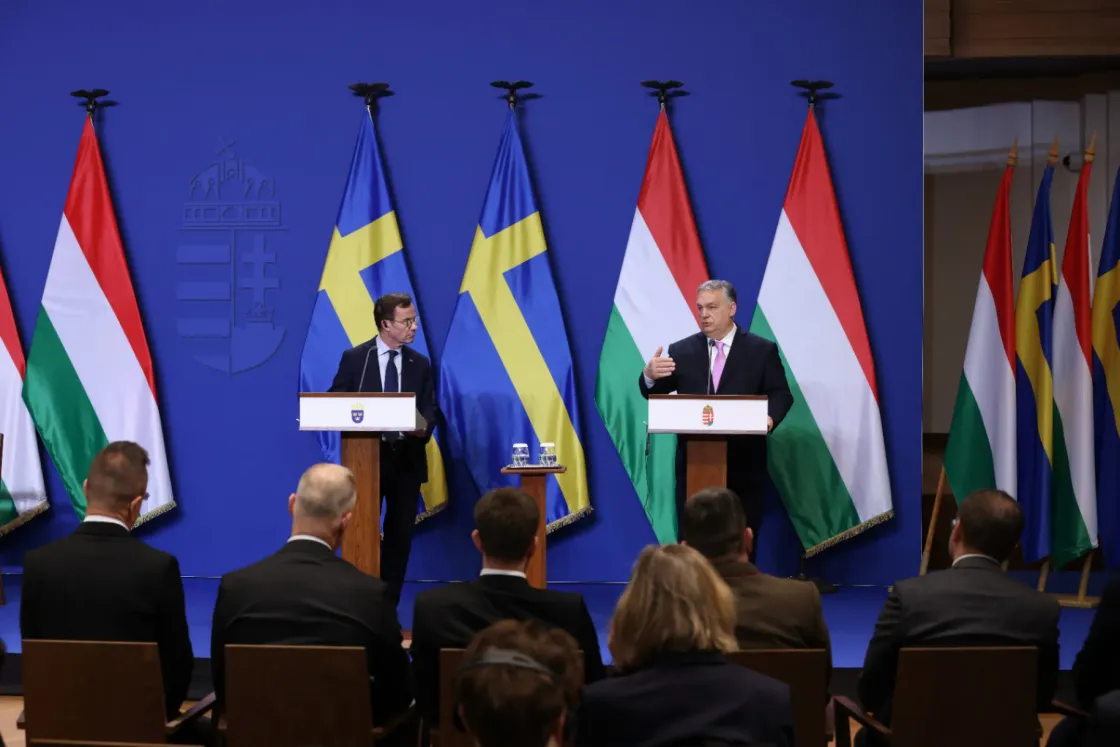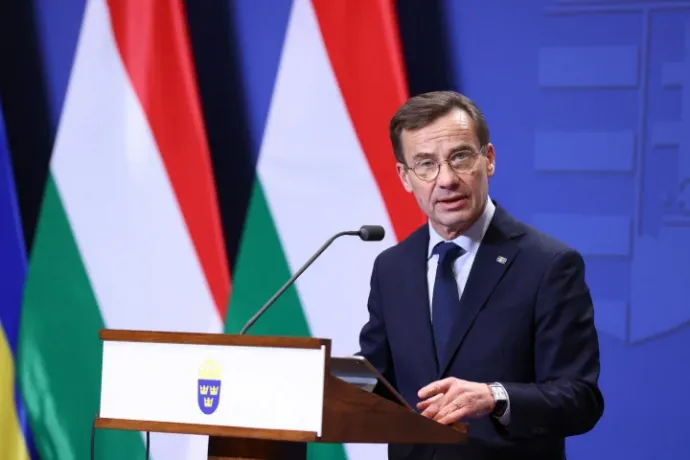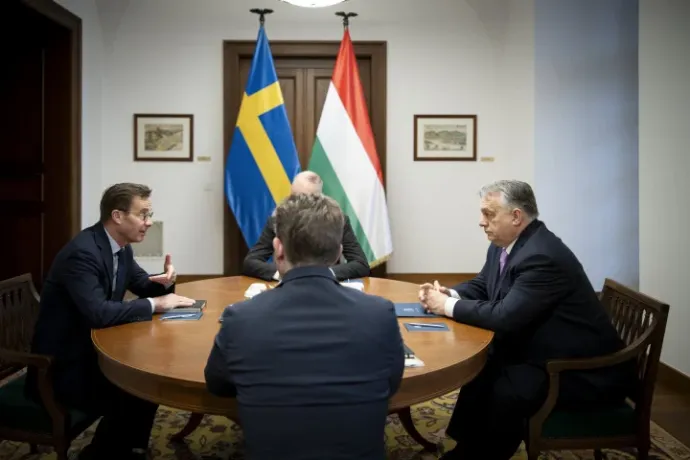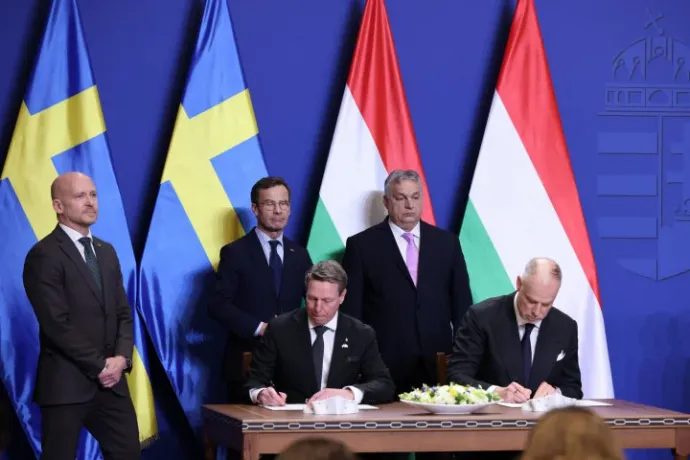Sweden and Hungary pledge to fight for each other once both are in NATO

"Today's meeting is part of a long process, we might call this long process a process of rebuilding trust. Today we can put an end to this phase", Hungarian Prime Minister Viktor Orbán said at a press conference with Swedish Prime Minister Ulf Kristersson in Budapest on Friday.
Orbán said that he succeeded in telling his Swedish counterpart that Hungarian foreign policy is about making friends, and in cases where we think differently, these differences must be clarified. He then went on to explain that "Sweden was a true friend of Hungary in 1956", as they welcomed the Hungarian refugees. "We hope we weren't a bad bargain for them," he said.
Orbán also shared his personal views. He mentioned that before Hungary joined the EU in 2004, the accession process was slower than the Hungarians would have liked, but at the time from among all the member states "Sweden argued for faster admission, and we remember that with great fondness".
"The present is also looking good", the Hungarian Prime Minister said: trade cooperation is a success story, we are now approaching the €3 billion mark. There is cooperation on nuclear issues, there is a Swedish player in Paks II, and Hungary hosted 70,000 Swedish tourists last year. "That's all very well and very nice, but we didn't talk about these things today. Today we talked about defence cooperation," Orbán joked.
The topic was Hungarian air defence. The Prime Minister said that it had previously been a question whether Hungary needed an air defence of its own and, if so, what technology should be used. This is how the Swedish Gripen planes came into the picture. But at the time we were still "broke", and weren't able to buy as many Gripens as we wanted at first. And this is the fleet which is now being expanded by four JAS 39 Gripen aircraft, while the existing contracts are being extended as they are due to expire. "In the changed security environment – that's how one should refer to the Russian-Ukrainian war in the language of diplomacy – this is of particular significance," he said.
In addition, "the logistics service system for military systems will be extended to include training as well", and an agreement has been reached with Sweden to open a centre of excellence with an artificial intelligence focus between Swedish Saab and the Hungarian Defence Innovation Research Institute in order to carry out research and development together. "This is a big ambition", Orbán said.
In the end, he added that the Hungarian Parliament will meet on Monday and will vote on Sweden's NATO membership.
Swedish Prime Minister Ulf Kristersson then said that the Gripen agreement would "benefit both countries". The Gripens are "the pride of Sweden, one of the really important products we can give to NATO, and I am delighted that more Gripens will be flying the skies of Europe". He also mentioned that two Hungarians recently received their Nobel Prizes in Stockholm.

After the statements, the press was given an opportunity to ask questions. One came from the Swedish public media. They asked Viktor Orbán what had changed his mind about Sweden's accession to NATO. The Hungarian Prime Minister responded that being a member of NATO means "being ready to fight for each other, to give our lives for each other", and that this requires a strong relationship based on trust and mutual respect. Rebuilding the eroded trust between the two countries required careful and prudent preparations from both sides. "This was not about changing our minds, we were going through a process." It would not be fair, he said, to say that the NATO issue had anything to do with the defence agreement because it was "not a business agreement". On the journey of a year and a half that has led up to this point, he said: "Not only am I satisfied with the result, I have enjoyed every step of this confidence-building between the two sides".
The Swedish public media asked the Swedish Prime Minister if, once they become members of NATO, he would continue to criticize the state of democracy in Hungary in the future, as he had done in the past. The Swedish Prime Minister replied that he respects the fact that the Hungarian Parliament is taking Hungarian decisions. And while it's a fact that the Swedes position on several issues differs from that of the Hungarians, they accept that. From now on, once we are both members of NATO, "we will fight for each other".
Hungarian public television asked when the Gripen aircraft are expected to arrive in Hungary. Orbán could not answer this question, saying that it would be the responsibility of the Minister of Defence, as he believes these agreements are complicated. "We decided to keep the air defence unit, we could have decided otherwise. But in the end, we decided in favour of it, mainly based on the opinion of the military," Orbán said, adding that this means Hungary will remain part of the joint operation to defend NATO's airspace. "This means that our commitment to NATO will be strengthened," he said.
Before the prime ministers spoke, the two defence ministers signed two agreements relating to Swedish Gripen aircraft.
Orbán ended up being the last one
The Swedish Prime Minister's visit to Budapest and the joint press conference with Viktor Orbán at the Karmelita (the PM's office) is probably the last act before the Hungarian parliament, with the approval of Fidesz, ratifies Sweden's accession to NATO following a year and a half of extended wrangling. Hungary will be the last country in the military alliance to approve the enlargement, which Sweden – along with Finland, which joined last year – requested in response to the changed security situation brought on by Russia's war against Ukraine. By joining the military bloc, Sweden is breaking with two centuries of neutrality.

Since September 2022, only Turkey and Hungary have stood in the way of the Scandinavian country joining NATO. Following the Slovak parliament's ratification, these were the only two of the alliance's 30 members that had not made the decision on Sweden's (and Finland's) membership.
This was followed by a prolonged period filled with promises on the Hungarian side. At first, the Hungarian government promised approval by the end of 2022, then by spring 2023, stressing that the Turks had not yet voted either, so deciding on the Swedish accession was not up to Hungary, and stressing that they were certain that the Hungarian Parliament would not be last to make the decision. In the end, they did become last, as Turkey approved enlargement with the Scandinavian country in January 2024.
The Turks made no secret of what they wanted
The Turkish position was well-known: Ankara opposed the inclusion of the two northern countries because they had given asylum to Kurdish politicians whom the Turkish government considers to be terrorists and has accused of separatism. Among them are several members of the Kurdish Workers' Party (PKK), which represents the Kurdish minority which makes up 15-20 percent of Turkey's population and which has – in a bid for greater autonomy – been engaged in an armed struggle of varying intensity against the Turkish state for almost 40 years. In return for its support for enlargement, Ankara has succeeded in persuading Sweden to tighten its anti-terrorism laws while NATO has agreed to create a special anti-terrorism coordinator.
Turkey was then allowed to buy fourty F-16s from the US for $23 billion and refurbish 79 more, which Washington was not willing to agree to as long as Turkey was holding up enlargement.
It is not clear what the Hungarian government was trying to achieve
Hungary's point of view was less clear: there was talk of social consultation, of the parliament being busy, and then of Fidesz being offended, claiming that Swedish politicians were talking about the rule of law in Hungary in a disrespectful way. A Hungarian delegation even visited the Swedes – and the Finns, who were finally admitted to NATO shortly afterwards – last March, and the delegation, formally led by Csaba Hende, seemed satisfied with the visit.
The former defence minister and the current head of the ministry, Kristóf Szalay-Bobrovniczky were both present on Friday as well. Szalay-Bobrovniczky was also positive, noting that the Hungarian air force is equipped with Swedish Gripen aircraft and that the government intends to continue this cooperation. Hende requested that "they stop saying that there is no rule of law in our country" and said that "one should not spread lies", although he formally removed the comments about the lack of rule of law from the pool of lies.

However, despite the visit last spring, the ratification still did not happen – or actually, it became separate from the approval of Finland's accession – and Fidesz then cited a debate within the Fidesz parliamentary group, which was divided on the issue, even though the Prime Minister was said to be in favour of membership. This was followed by House Speaker László Kövér saying that the Swedes hated their own country and that "we don't necessarily have to approve Sweden's accession". Apparently, it was a Swedish educational video about the state of Hungarian democracy that had upset the Speaker.
Only last December, PM Orbán said that the parliament couldn't stomach putting the issue on the agenda. The opposition parties didn't share the sentiment, and called for an extraordinary session of Parliament on 5 February, intending to approve Swedish accession, but Fidesz's absence prevented this from happening.
At that point, the visit of the Swedish Prime Minister was already the main demand of Hungary’s governing parties, which was initially something Stockholm dismissed, but eventually came to accept. And through this, we have arrived at the final stretch of ratification, a mere 19 months after Sweden had indicated its intention to join NATO.
Although at a government briefing in January, Gergely Gulyás described Sweden's possible accession as of low strategic importance, in reality NATO is being expanded with a strong military – just as it was the case for Finland, which shares a 1,300-kilometre border with Russia. This doubles the direct Russian-NATO border, which until now stretched only between Russia and the Baltic states and Poland by way of the Kaliningrad exclave.
Sweden's entry into NATO has narrowed the scope of movement for the Russian navy in the Baltic Sea, so the Finnish and Swedish enlargement is in fact a major strategic defeat for Vladimir Putin.
For more quick, accurate and impartial news from and about Hungary, subscribe to the Telex English newsletter!